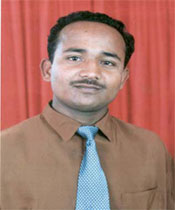Related Links
Case Updates
Krishna Adhikari
 On 6 June 2004, Krishna Prasad Adhikari, a resident of Fujel village of Gorkha District, was murdered in Chitwan District by Maoist cadres. Krishna Prasad was visiting his grandparents after having taken the SLC examinations, and he was abducted from Bakullahar Chowk by men who came on a motorcycle ...
On 6 June 2004, Krishna Prasad Adhikari, a resident of Fujel village of Gorkha District, was murdered in Chitwan District by Maoist cadres. Krishna Prasad was visiting his grandparents after having taken the SLC examinations, and he was abducted from Bakullahar Chowk by men who came on a motorcycle ... Maina Sunuwar
 Around 6 am on February 17, 2004, a group of RNA soldiers arrested Ms
Maina Sunuwar, a 15-year-old schoolgirl of Kharelthok VDC-6, Kavre
district. She disappeared since her arrest. Her family members, with
support from villagers and school where Maina was a student, visited
detention centers ...
Around 6 am on February 17, 2004, a group of RNA soldiers arrested Ms
Maina Sunuwar, a 15-year-old schoolgirl of Kharelthok VDC-6, Kavre
district. She disappeared since her arrest. Her family members, with
support from villagers and school where Maina was a student, visited
detention centers ... Sanjeev Kumar Karna
 Sanjeev Kumar Karna was one among the 11 persons arrested on October 8, 2003. On that fateful day, they had gone to attend a picnic program organized by the students at a place called Kariyachauri VDC-4, and from picnic, they went to Kataiya Chowri Area of Dhanusha district where they ate some food ...
Sanjeev Kumar Karna was one among the 11 persons arrested on October 8, 2003. On that fateful day, they had gone to attend a picnic program organized by the students at a place called Kariyachauri VDC-4, and from picnic, they went to Kataiya Chowri Area of Dhanusha district where they ate some food ... Arjun Bahadur Lama
Arjun Bahadur Lama, 48 years in age, permanent resident of Chhatrebas
VDC -5, Dapcha in Kavre district was abducted by a group of Maoist
cadres, three in number, on 29 April 2005 (2062.1.16 BS) from the
premises of Sri Krishna Secondary School at Chhatrebas VDC-1 of the
district.
» more
Hari Prasad Bolakhe
Hari Prasad Bolakhe, 35 (while missing) a permanent resident of Phulbari VDC-8, Kavre district, a pastor by profession, had been missing since the arrest December 27, 2003, was reportedly killed by security persons. A team of National Human Rights Commission discovered a human skeleton in a jungle ...
» more
Sarala Sapkota
Around 11 p.m. on July 15, 2004, a group of 12 armed soldiers arrested
Sarala Sapkota at her grandfather’s house. The family, who witnessed the
arrest, stated that soldiers gave Sarala no reason for her arrest.
After her arrest, Sarala’s family went to Baireni barracks and the DPO ...
» more
Birendra Shah
On the evening of 5 October 2007, Mr. Birendra Shah, 34, resident of Inruwasira VDC-8, Bara district, a local journalist of Bara district and correspondent of Nepal FM, Avenues Television and Dristi weekly, was abducted by Maoists from Pipara Bazaar in Kalaiya, the district headquarters of Bara ...
» more
Bishwanath Parajuli, Tom Nath Poudel and Dhan Bahadur Tamang
Three persons namely Bishwonath Parajuli (also called Nagendra
Parajuli), Tom Nath Poudel and Dhan Bahadur Tamang of Hasandaha VDC,
Morang were shot dead by the security personnel on 28 September 2004.
According to the eyewitnesses, other victims and the villagers, about 16
people were arrested ...
» more
Chot Nath Ghimire and Shekhar Nath Ghimire
Chot Nath Ghimire, a 58-year-old farmer, resident of Ishaneshor VDC-4,
Ratamate Majhpokhari of Lamjung district was allegedly arrested by the
Joint Security Forces of Joint Security Camp stationed at Bhorlatar VDC,
Lamjung district on February 2, 2002 (2058.10.20). The security camp
called Mr. ...
» more
Bhauna Tharu
Bhauna Tharu (Bhauna Chaudhary in the citizenship card), 21 years old
male (at the time of the incident; Date of Birthe: 8 September 1978),
son of Purna Bahadur Chaudhary, permanent resident of Sujanpur village,
Neulapur VDC-4, Bardiya district, and an employee of Rastriya Gobar Gas,
Gulariya, ...
» more
Surya Prasad Sharma (Disappearance)
In April 2006, Mrs. Sharma submitted a communication to the HRC under the Optional Protocol to the ICCPR. In October 2008, in its first ever case from Nepal considered under the Optional Protocol, the HRC found violations of Article 2(3) (the right to an effective remedy), Article 7 (the right not to be tortured), 9 (the right to liberty and security of person) and 10 (respect for the inherent dignity of a human person) of the ICCPR. It directed the government to thoroughly investigate the incommunicado detention and subsequent disappearance of Surya Prasad Sharma, to release him immediately if he is still alive, to provide adequate information resulting from its investigation, and adequate compensation for his wife and her family. The decision further affirms the state’s obligation to “not only conduct thorough investigations into alleged violations of human rights, particularly disappearances and acts of torture, but also to prosecute, try and punish those held responsible for such violations.” Amid sustained pressure from Mrs. Sharma, the Government in April 2009 responded to the Committee stating Mrs. Sharma will be provided with “interim relief” and that the disappearance of Mr. Sharma will be investigated by an Independent Disappearance Commission to be established “shortly”. In a further communication to the Committee, Mrs. Sharma contested the proposed follow-up by the government, arguing that the measures proposed did not meet the requirements set out by the Human Rights Committee in its view on the case.
Action taken: Following a meeting with the Secretary to the Council of Ministers on 23 November 2009 and a follow-up letter sent on 8 December 2009, the Government provided Mrs. Sharma with NRs 100,000 (additional to an earlier NRs 100,000 “interim relief” received by many “conflict victims”), bringing the total to NRs 200,000, the amount promised by the Government to the Human Rights Committee. A bill for the establishment of an Independent Disappearances Commission was put before the Parliament in April 2010. AF, together with other organizations, provided comments and worked with individual members of parliament to submit amendments to the bill. As of November 2010, amid a political stalemate in the country, the bill is pending before the Drafting Committee. In parallel, on 11 March 2010, AF sent an update to the Human Rights Committee, informing its members about the steps taken by the government to implement the View of the Committee, but maintaining that the interim relief cannot in any way be a substitute for proper compensation and wide reparation to Mrs Sharma; and continuing to argue that the Independent Disappearances Commission (which, according to the draft bill, will not have powers to prosecute) is not an appropriate mechanism; that instead a proper criminal investigation is warranted. The government provided further clarification to the Committee on its position that in a letter of 28 July 2010. A detailed response to the government’s response was submitted to the Committee on 30 November 2010, reiterating the earlier position that the interim relief cannot in any way be a substitute for proper compensation and reparation to Mrs. Sharma; and that the Commission to Investigate Disappearances and the Truth and Reconciliation Commission are not judicial bodies and therefore not appropriate mechanisms to address the state’s obligation to investigate and prosecute, try and punish those held responsible for grave human rights violations; that instead a proper criminal investigation is warranted. Given these two transitional justice mechanisms have not been established, the letter also argued that the government was failing in its duty to provide a guarantee of “prompt” investigation and prosecution.
Full Text of the HRC Decision on Sharma Case.
Action taken: Following a meeting with the Secretary to the Council of Ministers on 23 November 2009 and a follow-up letter sent on 8 December 2009, the Government provided Mrs. Sharma with NRs 100,000 (additional to an earlier NRs 100,000 “interim relief” received by many “conflict victims”), bringing the total to NRs 200,000, the amount promised by the Government to the Human Rights Committee. A bill for the establishment of an Independent Disappearances Commission was put before the Parliament in April 2010. AF, together with other organizations, provided comments and worked with individual members of parliament to submit amendments to the bill. As of November 2010, amid a political stalemate in the country, the bill is pending before the Drafting Committee. In parallel, on 11 March 2010, AF sent an update to the Human Rights Committee, informing its members about the steps taken by the government to implement the View of the Committee, but maintaining that the interim relief cannot in any way be a substitute for proper compensation and wide reparation to Mrs Sharma; and continuing to argue that the Independent Disappearances Commission (which, according to the draft bill, will not have powers to prosecute) is not an appropriate mechanism; that instead a proper criminal investigation is warranted. The government provided further clarification to the Committee on its position that in a letter of 28 July 2010. A detailed response to the government’s response was submitted to the Committee on 30 November 2010, reiterating the earlier position that the interim relief cannot in any way be a substitute for proper compensation and reparation to Mrs. Sharma; and that the Commission to Investigate Disappearances and the Truth and Reconciliation Commission are not judicial bodies and therefore not appropriate mechanisms to address the state’s obligation to investigate and prosecute, try and punish those held responsible for grave human rights violations; that instead a proper criminal investigation is warranted. Given these two transitional justice mechanisms have not been established, the letter also argued that the government was failing in its duty to provide a guarantee of “prompt” investigation and prosecution.
Full Text of the HRC Decision on Sharma Case.
























Join Us